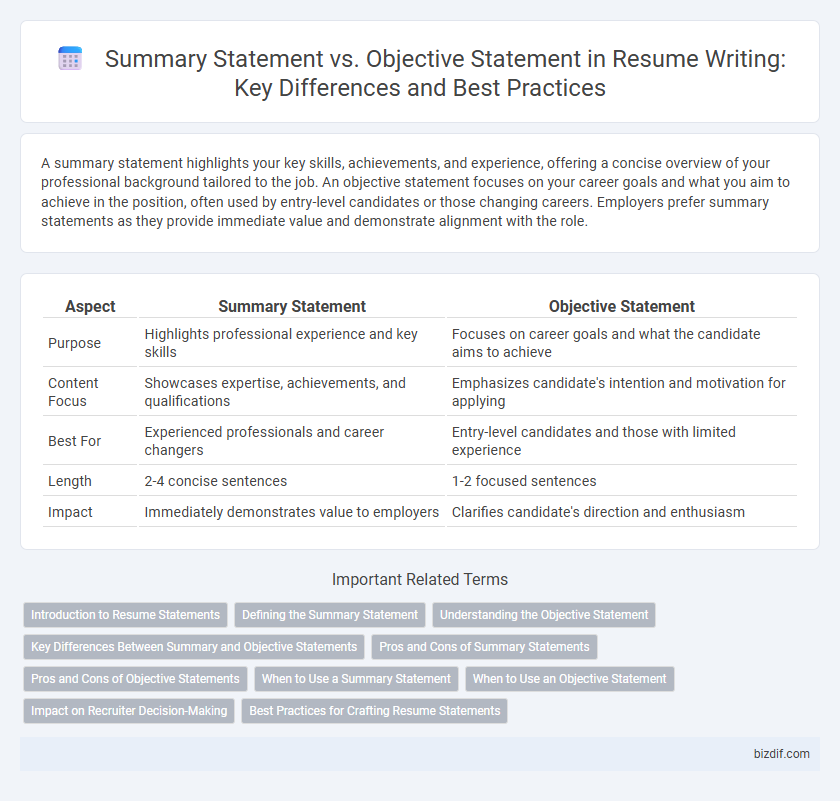A summary statement highlights your key skills, achievements, and experience, offering a concise overview of your professional background tailored to the job. An objective statement focuses on your career goals and what you aim to achieve in the position, often used by entry-level candidates or those changing careers. Employers prefer summary statements as they provide immediate value and demonstrate alignment with the role.
Table of Comparison
| Aspect | Summary Statement | Objective Statement |
|---|---|---|
| Purpose | Highlights professional experience and key skills | Focuses on career goals and what the candidate aims to achieve |
| Content Focus | Showcases expertise, achievements, and qualifications | Emphasizes candidate's intention and motivation for applying |
| Best For | Experienced professionals and career changers | Entry-level candidates and those with limited experience |
| Length | 2-4 concise sentences | 1-2 focused sentences |
| Impact | Immediately demonstrates value to employers | Clarifies candidate's direction and enthusiasm |
Introduction to Resume Statements
Summary statements highlight key skills, achievements, and professional experiences to quickly convey a candidate's qualifications to employers. Objective statements focus on career goals and the type of position sought, emphasizing the applicant's ambitions rather than past accomplishments. Choosing between these resume statements depends on the candidate's experience level and the specific job application context.
Defining the Summary Statement
A Summary Statement is a concise paragraph that highlights a candidate's professional experience, key skills, and accomplishments to showcase qualifications relevant to the job. Unlike an Objective Statement, which focuses on career goals, the Summary Statement emphasizes proven expertise and value offered to employers. This section improves resume impact by quickly conveying career highlights to hiring managers and applicant tracking systems (ATS).
Understanding the Objective Statement
An Objective Statement clearly defines a candidate's career goals and the specific position they are targeting, making it essential for entry-level applicants or those changing industries. This statement typically highlights the job seeker's intentions and what they aim to achieve within the company. Understanding the purpose of an Objective Statement helps tailor a resume towards desired roles by aligning personal aspirations with employer needs.
Key Differences Between Summary and Objective Statements
Summary statements highlight a candidate's professional experience, skills, and achievements, providing a concise overview tailored to the job description. Objective statements emphasize the candidate's career goals and intentions, often targeting entry-level positions or career changes. The key difference lies in the focus: summaries demonstrate qualifications and value, while objectives express ambitions and desired roles.
Pros and Cons of Summary Statements
Summary statements in resumes effectively highlight key skills and professional achievements, making it easier for recruiters to quickly assess a candidate's qualifications. They provide a concise overview tailored to the specific job, improving keyword optimization for applicant tracking systems (ATS). However, summary statements may come across as generic if not carefully customized and risk excluding important early-career details relevant to entry-level applicants.
Pros and Cons of Objective Statements
Objective statements in resumes clearly state the applicant's career goals, providing recruiters with immediate insight into the candidate's aspirations, but they can limit perceived flexibility and appear outdated compared to summary statements. They are beneficial for entry-level candidates or those changing careers by emphasizing intent, though they may lack detailed evidence of skills or accomplishments. Employers sometimes prefer summary statements for their concise display of relevant expertise, making objective statements less impactful in competitive job markets.
When to Use a Summary Statement
Use a Summary Statement on resumes when you have substantial professional experience or a diverse skill set to highlight. It effectively showcases your key achievements and expertise tailored to the job description, making your candidacy stand out. This statement is ideal for mid-level to senior professionals aiming to provide a concise overview of their qualifications and career accomplishments.
When to Use an Objective Statement
An Objective Statement is most effective for entry-level candidates, career changers, or those with limited work experience seeking to clearly convey career goals and align them with the prospective employer's needs. It provides a focused, concise expression of professional intentions and the type of role desired, making it easier for hiring managers to understand the applicant's motivations. Use an Objective Statement when applying for specific positions where the candidate wants to highlight targeted aspirations and emphasize a clear fit with company objectives.
Impact on Recruiter Decision-Making
Summary statements provide recruiters with a concise overview of a candidate's skills, achievements, and value, enhancing quick decision-making by highlighting relevant qualifications. Objective statements often focus on the applicant's career goals, which may offer less immediate insight into their potential contributions to the organization. Recruiters tend to favor summary statements for their clear demonstration of a candidate's impact and alignment with job requirements.
Best Practices for Crafting Resume Statements
Crafting an effective resume statement requires tailoring a Summary Statement to highlight key skills and professional achievements, demonstrating value to potential employers through clear, concise language. Objective Statements should be focused and specific, aligning career goals with the job role while avoiding vague or generic phrases. Best practices emphasize quantifiable achievements, relevant keywords from the job description, and a results-oriented approach to capture attention and increase interview opportunities.
Summary Statement vs Objective Statement Infographic

 bizdif.com
bizdif.com